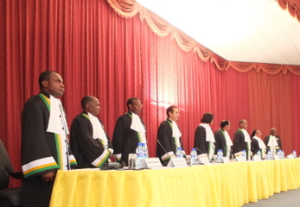
During its 31st Ordinary Session, the African Court on Human and Peoples’ Rights (AfCHPR) held public hearings in two pending cases, one involving the unsolved assassination of a prominent journalist in Burkina Faso and the other concerning alleged criminal due process violations and arbitrary detention in Tanzania. On November 28-29, the AfCHPR heard arguments on the merits in Beneficiaries of the Late Norbert Zongo et al. v. Burkina Faso. [AfCHPR Press Release: Zongo] On December 2-4, the AfCHPR held a hearing in Peter J. Chacha v. Tanzania regarding the admissibility of the case, including the government’s preliminary objections regarding the court’s jurisdiction ratione materiae. [AfCHPR Press Release: Chacha] These cases represent two of a total of eight cases pending before the regional human rights tribunal, which has resolved nineteen individual complaints to date, most of which have been deemed inadmissible. [IJRC]
Beneficiaries of Late Norbert Zongo et al. v. Burkina Faso
The case of Beneficiaries of the Late Norbert Zongo et al. v. Burkina Faso, App. No. 013/2011 relates to the assassination of investigative journalist Mr. Zongo, as well as the deaths of his companions, Abdoulaye Nikiema (alias Ablassé) and Blaise Illboudo, and brother, Ernest Zongo, in December 1998. Mr. Zongo’s assassination is alleged to be related to his investigation of David Ouédraogo, a driver assigned to François Compaoré, brother of the President of Burkina Faso and a top aide. The application to the AfCHPR alleges violations of the African Charter on Human and Peoples’ Rights, the Treaty of the Economic Community of West African States (ECOWAS), the International Covenant on Civil and Political Rights, and the Universal Declaration of Human Rights with regard to the victims’ rights to: freedom of expression, non-discrimination, equal protection, judicial protection, and life. [AfCHPR Case Summary]
During the public hearing, the applicants’ representatives argued that no justice has been delivered against the assassins of Mr. Zongo, and Burkina Faso has not met its responsibility to find and prosecute those responsible. They explained that, for many years since Mr. Zongo’s assassination in 1998, his case and the case of the other three men that died alongside him have languished with no remedies, demonstrating a “pattern of impunity.” See African Court on Human and Peoples’ Rights, Live Show [Procaster] Fri Nov 29 2013 02:20:28AM, available at http://www.livestream.com/afchpr.
In March 2013, the African Court heard oral arguments from the parties on the preliminary objections raised by Burkina Faso, after which it issued an admissibility decision in the case. [AfCHPR Press Release: Zongo March Hearing] See AfCHPR, Beneficiaries of Late Norbert Zongo et al. v. Burkina Faso, App. No. 013/2011, Ruling of 21 June 2013 (in French).
Peter J. Chacha v. Tanzania
During its 31st Ordinary Session, the AfCHPR heard arguments on admissibility from both parties in the case of Peter J. Chacha v. Tanzania, App. No. 003/2012. Mr. Chacha alleges that he was unlawfully arrested, interviewed, charged and detained and his property was unlawfully searched and seized by government agents, in contravention of provisions of Tanzania’s Criminal Procedure Act and Constitution. [AfCHPR Case Summary] He argues that the pending criminal cases against him do not preclude him from seeking redress before the African Court. With regard to the pending criminal charges against him, Mr. Chacha specifically claims violations of his rights to be free from cruel, inhuman or degrading treatment; to a fair and speedy trial; and to an effective remedy.
During the hearing, his attorney argued that Mr. Chacha was denied an opportunity to mount an adequate defense because the prosecutors were constantly changing the material facts underpinning the charges against him. See African Court on Human and Peoples’ Rights, Live Show [Procaster] Wed Dec. 4 2013 02:45:28AM, available at http://www.livestream.com/afchpr. His attorney also argued that Mr. Chacha was not tried within a reasonable time given the allegedly unreasonable delay between the preliminary hearing and his trial date. Regarding the authorities’ search and seizure of property, Mr. Chacha also alleged that his property had never been returned and no reasonable explanation was given as to why.
Attorneys for the government argued that authorities had complied with Tanzanian law on criminal procedure, stating that Mr. Chacha had been lawfully detained and his charging sheets properly reflected the charges against him of armed robbery and murder. Furthermore, Tanzania’s representatives argued that the AfCHPR would not have jurisdiction to examine the merits of Mr. Chacha’s complaint because doing so would require the resolution of national law issues, which would place the case’s subject matter outside of the application and interpretation of the African Charter on Human and Peoples’ Rights. Additionally, the government argued that Mr. Chacha had failed to exhaust domestic remedies before submitting his application to the AfCHPR.
After the conclusion of a hearing, the AfCHPR judges hold private deliberations, after which they must issue a decision within 90 days, pursuant to Rule 59 of the AfCHPR’s Rules of Court. For more information on both hearings, visit the African Court on Human and Peoples’ Rights website or watch the hearings online at http://www.livestream.com/afchpr.
